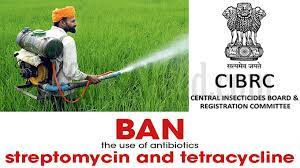‘PROHIBITION OF STREPTOMYCIN + TETRACYCLINE IN AGRICULTURE’

Disclaimer: Copyright infringement not intended.
Context
- The Union Ministry of Agriculture and Farmers Welfare recently notified the draft order on ‘Prohibition of Streptomycin + Tetracycline in agriculture’, which prohibits import, manufacture or formulation of Streptomycin and Tetracycline for use in agriculture from February 1, 2022.
Wha is AMR?
- Antimicrobial resistance (AMR) is the ability of microorganisms to persist or grow in the presence of drugs designed to inhibit or kill them.
- These drugs, called antimicrobials, are used to treat infectious diseases caused by microorganisms such as bacteria, fungi, viruses and protozoan parasites.
- When microorganisms become resistant to antimicrobials, standard treatments are often ineffective, and in some cases, no drugs provide effective therapy. Consequently, treatments fail.
- This increases illness and mortality in humans, animals and plants.
Impact of AMR on agriculture
- The use of antimicrobials, leads to the emergence of resistance and the transmission of resistant genes and resistant bacteria between plant species.
- For agriculture, AMR causes production losses, damages livelihoods and jeopardizes food security.
- Moreover, AMR can spread among different hosts and the environment, and antimicrobial resistant microorganisms can contaminate the food chain.
- AMR in food and agriculture poses risks to food systems, livelihoods and economies.
- The use of antimicrobials in agriculture contributes to the spread of AMR and undermines the effectiveness of veterinary medicines.
- The consequences of antimicrobial resistance include reduced food production, reduced food security, greater food safety concerns, higher economic losses to farm households, and contamination of the environment.
- Making sure these treatments remain effective and available to the agriculture sector is critical.
Antibiotic misuse in agriculture
- Delhi-based non-profit Centre for Science and Environment in 2019 highlighted the practices of antibiotic misuse in the crop sector in India.
- It showed how streptocycline (90:10 combinations of streptomycin and tetracycline) was being misused along the banks of the Yamuna in national capital Delhi, Hisar (Haryana) and Fazilka (Punjab).
- It found that farmers there routinely and indiscriminately used high doses of streptomycin on crops, including on the ones for which they had not received any approval.
- CSE had recommended these antibiotics should not be used as pesticides, and that they be used under expert supervision only after a bacterial disease has been diagnosed in a crop.
The recent draft
- The draft order comes over growing concerns over antimicrobial resistance observed in various crops, particularly to streptomycin, which is used in the treatment of tuberculosis (TB).
- Tetracycline antibiotics find application in the treatment of bacterial infections.
- Streptomycin is a critically important antimicrobial while tetracycline belongs to the class of highly important antimicrobials, according to the World Health Organization.
- The order ensures a complete ban on the use of the two antibiotics in agriculture January 1, 2024, onwards.
- It directed every state government to take all such steps necessary for executing the order in their state.
- The draft order is the result of the deliberations within the Central Insecticides Board and Registration Committee (CIBRC), where the registration committee (RC) had approved the recommendation for phasing out the use of streptomycin and tetracycline amid growing concerns over antimicrobial resistance (AMR).
- The phase-out was considered “according to the availability of alternatives”.
Significance
- This is an important step ahead towards reducing the burden of AMR in the country.



1.png)
